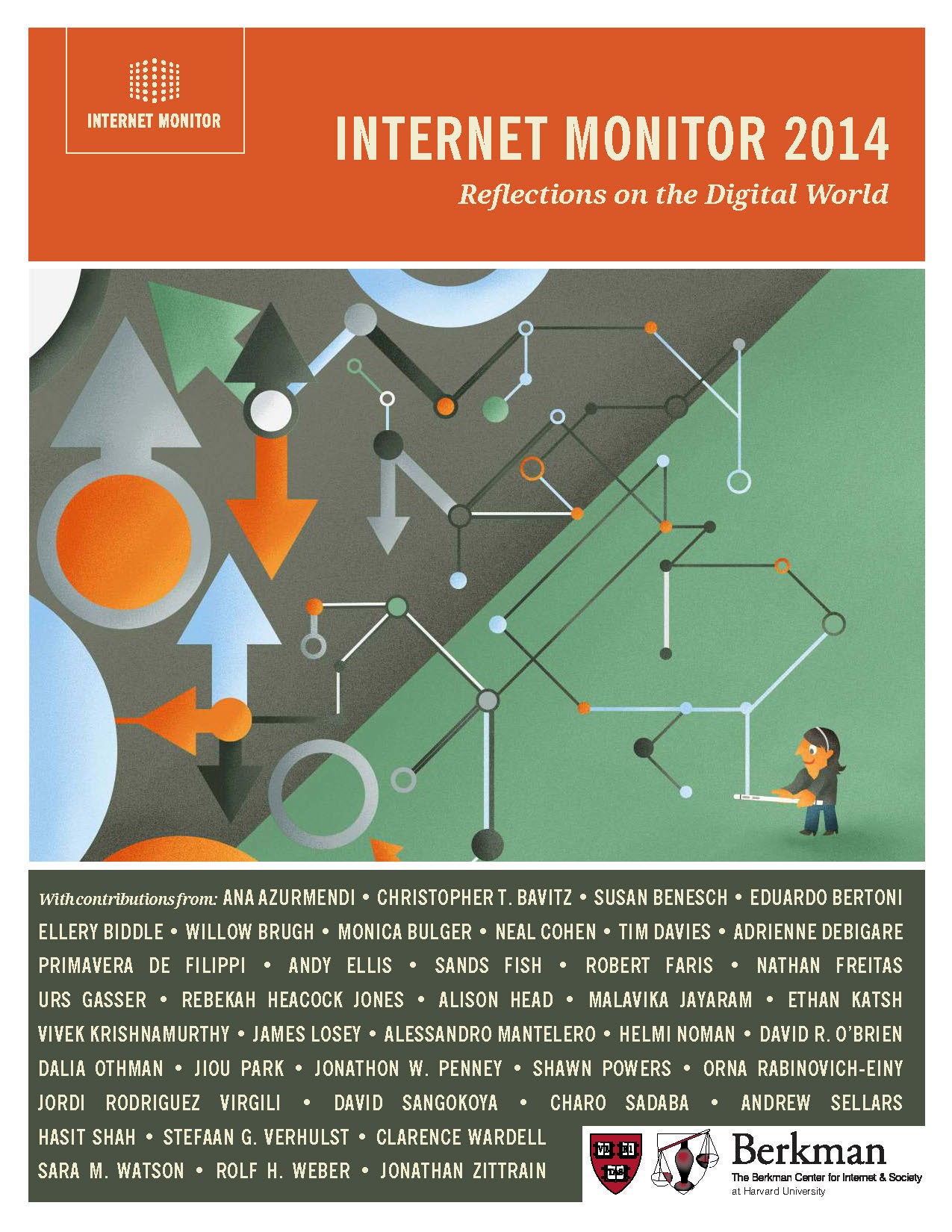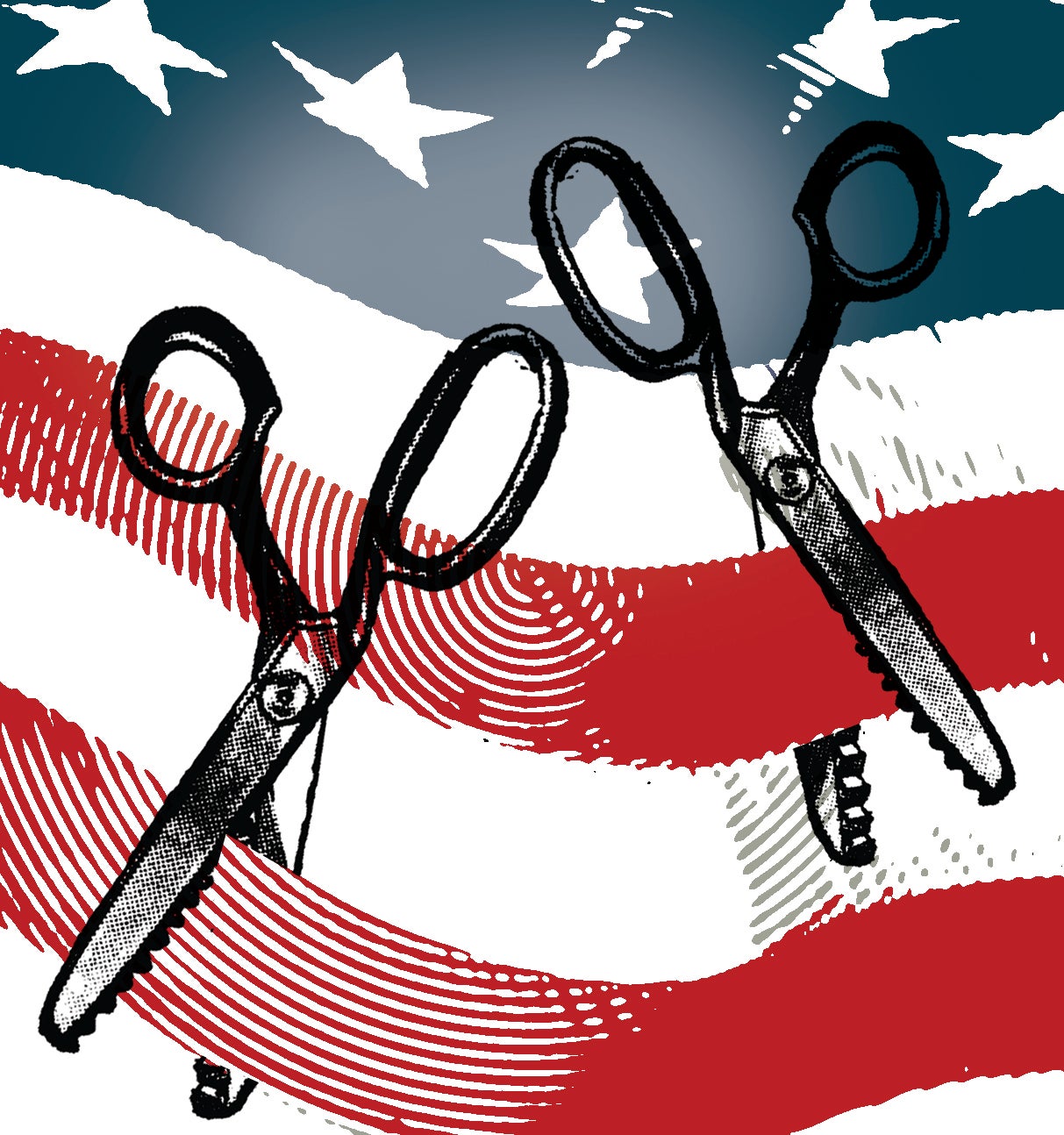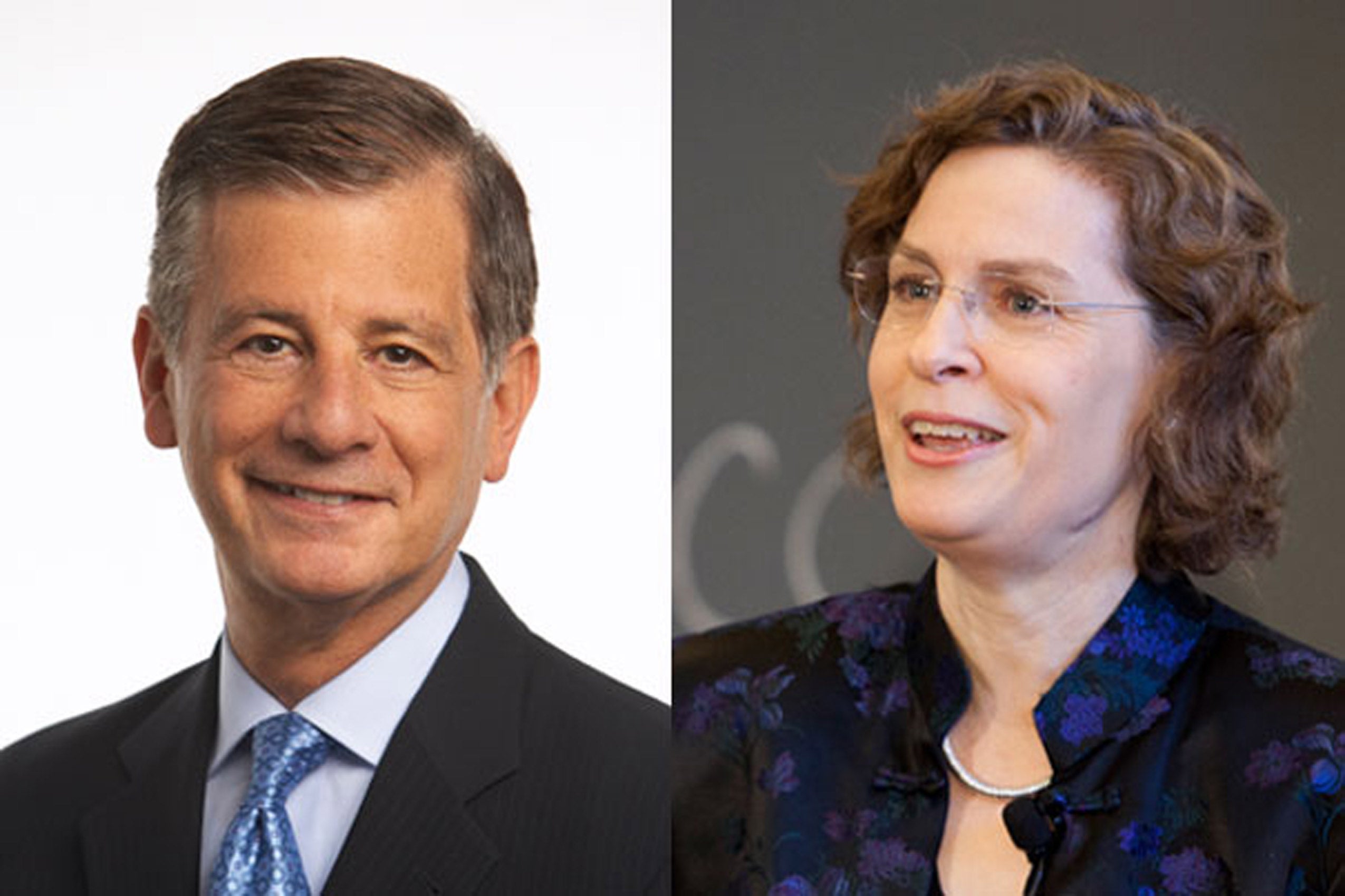People
Jonathan Zittrain
-
Harvard vs Cameron: Professors defend encryption (registration)
January 22, 2015
The proposals by David Cameron, the UK prime minister, to make illegal forms of encryption that would block intelligence services from reading messages from terrorist suspects were criticised yesterday in by a group of Harvard professors....Jonathan Zittrain, a professor of law and computer science, said that the proposals, which Mr Cameron has pledged to implement if he is re-elected as prime minister this year, would have a huge impact on the way that the digital economy worked. “This is not just about hardware but software. You would have to find a way for a phone not to be able to download any app that could defeat [the breaking of] encryption,” he said. “That would be a referendum on our entire ecosystem.”
-
The annual Word Economic Forum in Davos is a renowned event that engages political, business, academic and other leaders of society in shaping a collaborative global agenda. This year's program appears even more stimulating than usual, covering a variety of technology topics and featuring a whole section devoted at exploring tomorrow's online issues...Jonathan Zittrain, co-founder at Harvard's Berkman Center has spent many years researching the future of the Internet, and his 2009 book (under the same title) provides an important and still current overview of the Net evolution and its most urgent problems -- such as privacy, copyright, security and related regulations. In June 2013, Jonathan Zittrain co-authored also a pivotal report produced by the Council on Foreign Relations, directed by Adam Segal and involving also Professor Anne-Marie Slaughter (New America Foundation) -- "Defending an Open, Global, Secure, and Resilient Internet". The report proves still very relevant, especially for its detailed analysis about the many reasons preventing US and Europe in establishing a shared approach to address and draft common regulations about the Internet.
-
Could Facebook be a factor in the next election?
January 5, 2015
There are two things about 2015 of which one can be reasonably certain: there will be a general election in May and it’s unlikely to produce an overall majority for either of the two big parties...Which brings us to social media and the question of whether the 2015 general election could be the first one in which the outcome is affected by what goes on there....The Harvard law professor Jonathan Zittrain summarised the findings thus: “Overall, users notified of their friends’ voting were 0.39% more likely to vote than those in the control group, and any resulting decisions to cast a ballot also appeared to ripple to the behaviour of close Facebook friends, even if those people hadn’t received the original message. That small increase in turnout rates amounted to a lot of new votes.
-
North Korea linked to Sony hacking
December 18, 2014
Federal investigators have now connected the hacking of Sony Pictures Entertainment Inc. to North Korea, a U.S. official said Wednesday, though it remained unclear how the federal government would respond to a break-in that exposed sensitive documents and ultimately led to terrorist threats against moviegoers....Jonathan Zittrain, a professor of law and computer science at Harvard University, said Sony was unquestionably facing anger over the breach and the resulting disclosure of thousands of sensitive documents. But the movie studio may be able to mitigate that reaction and potential legal exposure if it's established that North Korea was behind the attack." If Sony can characterize this as direct interference by or at the behest of a nation-state, might that somehow earn them the kind of immunity from liability that you might see other companies getting when there's physical terrorism involved, sponsored by a state?" Zittrain said.
-
Reflections on the Digital World: Internet Monitor releases 2014 report
December 17, 2014
Internet Monitor, a research project based at Harvard Law School's Berkman Center for Internet and Society, recently published the project's second annual report, "Internet Monitor 2014: Reflections on the Digital World," a collection of roughly three dozen short contributions that highlight and discuss some of the most compelling events and trends in the digitally networked environment over the past year.
-
Big-Data Scientists Face Ethical Challenges After Facebook Study
December 17, 2014
Though it may not feel like it when you see the latest identity-affirming listicle shared by a friend on Facebook, we are a society moving toward evidence. Our world is ever more quantified, and with such data, flawed or not, the tools of science are more widely applied to our decisions...It’s also quaint to think that users would click through the multiple dialogue boxes necessary to mimic informed consent, said Jonathan L. Zittrain, director of the Berkman Center for Internet and Society at Harvard University. Would you? Instead, he said, there ought to be independent proxies who represent the users and can perform that checking function. "I worry about leaning too hard on choice," he said, "when the real thing is just treat your users with dignity."
-
Marketplace Tech for Friday, December 12, 2014
December 12, 2014
First up, Jonathan Zittrain of Harvard Law School talks about the implications behind Google News shutting down operations in Spain. And Tony Gallippi, Co-Founder and Executive Chairman of BitPay, explains why Bitcoin may become more mainstream … especially now that Microsoft has started accepting it. Plus, how well have you kept up with the week in tech news? It's time for Silicon Tally. This week, host Ben Johnson takes on Paul Kedrosky, partner at SK Ventures.
-
Coming Soon to Yale: A Class Taught by Harvard
December 5, 2014
Want to take a popular Harvard course? Go to Yale. Next fall, Yale University in New Haven, Conn., will offer a computer-science class in which its students will watch live-streamed lectures from Harvard University, and students on both campuses will take uniform tests, visit one another and collaborate in other ways both digital and physical...“A shared course allows for interactions not possible within a single physical classroom…cultivating a healthy diversity of viewpoints,” said Jonathan Zittrain, a Harvard Law School professor who co-founded the school’s Berkman Center for Internet & Society.
-
Faculty Sampler: Short takes from recent op-eds
November 24, 2014
“How to Deregulate Cities and States” Professor Cass R. Sunstein ’78 and Harvard economics Professor Edward Glaeser The Wall Street Journal Aug. 24, 2014 “In 2011…
-
Note to future self
November 19, 2014
A decade ago, dozens of former fighters from both sides of Northern Ireland's Troubles sat down to talk about their roles for the oral history the Belfast Project. They were assured that the recordings would not be made public until after their deaths. But in July 2013, Boston College, which had been storing the recordings, was forced to release several tapes to Northern Ireland's police service as part of an investigation into the 1972 murder of Jean McConville. Such transgressions have got Jonathan Zittrain, director of the Berkman Center for Internet and Society at Harvard University, thinking about how to ensure that data are protected for the promised time period. Among other concerns, he worries for philanthropic donations of papers or personal effects to libraries and the like. Often, such donations are made with a proviso that they not be revealed for a fixed period of time. “That type of donation will not happen if their stuff is only one subpoena away from disclosure,” he says. Mr Zittrain has just received a $35,000 grant from the Knight Foundation, an organisation dedicated to "informed and engaged communities", to create an encrypted "time-capsule" service. Its aim is to enable scholars and journalists to securely send a message, in effect, into the future—encrypted in such a way that it cannot be read by anyone until a certain date or event.
-
Is the Internet equal around the world?
November 14, 2014
“Net neutrality” — you hear those two words a lot these days....To understand the concept of net neutrality you first have to understand the backdrop of the Internet itself, says Jonathan Zittrain who heads the Berkman Center for Internet and Society at Harvard Law School. “The Internet is kind of a collective hallucination. It is only a set of protocols that say if somebody joining this network, connecting however it can, speaks those protocols, it’s a full-fledged member of the network. That’s one reason why the Internet has no main menu, it has no CEO, it has no business plan,” says Zittrain.
-
Bol Notifies Students Affected by Controversial Attendance Study
November 13, 2014
Vice Provost for Advances in Learning Peter K. Bol, who authorized a now-controversial lecture attendance study that involved photographing students without their knowledge last spring, notified the students who took the affected courses by email on Wednesday...Kyros Law in Hingham, Mass. is actively seeking faculty and students to take part in a potential class action lawsuit against the University for allegedly violating privacy and breaking state and federal laws through the attendance study....“A lawsuit is an awful way to sort out a situation like this one,” Computer Science and Law Professor Jonathan L. Zittrain wrote in an email Monday to The Crimson, adding that “there may be reasons to rethink how studies of this sort are done—who approves them, and who's informed about it before, during, and after —but I don't see any useful role for a lawsuit here, and I suspect the plaintiff's firm is rather hoping to simply settle, banking on the University not wishing ongoing bad publicity.”
-
Fighting for the right to be forgotten on the Web
November 10, 2014
Every time Gary Katcher sees the article, he feels that his reputation is being dragged through the mud again. It's an article from Forbes, dated Jan. 13, 2012, touching on a lawsuit between him and an ex-partner in his investment firm over a nasty business divorce. The article was accurate, reporting fairly on the claims of wrongdoing exchanged between the former partners during four years of litigation. It eventually was settled in Katcher's favor, but the magazine never ran a follow-up...Options for an American right to be forgotten are beginning to emerge. Jonathan Zittrain, co-founder of Harvard's Berkman Center for Internet and Society, says focusing on search engines "allows for the information itself to remain public, with a question of how to narrow the indexing of it." He also praised an experiment launched by Google years ago, allowing people quoted or mentioned in a news article to append a clarifying comment next to the article on the Google News service. The function doesn't appear to be available any longer.
-
Microsoft Exec Discusses Data Surveillance
November 5, 2014
Technology companies and the federal government are locked in an escalating legal battle over data surveillance and consumer rights, said Microsoft’s General Counsel Brad Smith at a Law School forum Tuesday...Conversing with Law School Professor Jonathan L. Zittrain, who moderated the forum, Smith argued that the U.S. government must respect both domestic and international privacy laws, instead of unilaterally and opaquely obtaining data.
-
Microsoft’s top legal gun decries privacy ‘arms race’
November 5, 2014
The conflict between snooping governments seeking to defeat encryption and users demanding ever more robust privacy tools has turned into an arms race -- and it's time for arms control talks, Microsoft's general counsel said on Tuesday. Resolving that conflict requires a new consensus on how to balance public safety and personal privacy, Brad Smith said in a forum at Harvard Law School...In an expansive conversation about privacy and rebuilding trust in technology after revelations of widespread government spying, Smith talked about Microsoft's first "sea-change" moment. It came in the year after the September 2001 terrorist attacks, when Microsoft, among other Internet companies and telcos, was asked to voluntarily share data with U.S. law enforcement. In the heat of the moment, in 2002, "it was easy to do things that we wouldn't otherwise do," Smith told Jonathan Zittrain, a professor of law and computer science at Harvard who moderated the event.
-
How Facebook Could Skew an Election
November 5, 2014
Open Facebook today and you’ll see a public service announcement of sorts. “It’s Election Day,” proclaims the text. “Share that you’re voting in the U.S. Election and find out where to vote.”...In other words, to paraphrase Harvard professor Jonathan Zittrain, the 2000 presidential election—where George W. Bush won Florida by 537 votes—could have been altered by a Facebook election button...As Zittrain wrote earlier this year, the company could easily combine that tranche of data with selective deployment of its “I Voted” button and tilt an election. Just make certain populations more likely to see the button, and, ta-da: modification managed.
-
Technology and data analytics should transform municipal government, Harvard professors say
October 20, 2014
Rarely is the term “city hall” considered synonymous with the words “innovation” or “efficiency.” Too often, the public image of municipal government is of a…
-
The Knight Foundation today announced the latest winners of its Knight Prototype Fund. Eighteen projects will receive $35,000 to help them bring their concepts closer to fruition. The fund, launched in 2012, also gives winners a support network and the opportunity to receive human-centered design training in an effort bring early stage media ideas to a formal launch...Meet the winners...Harvard Library Innovation Lab/Berkman Center for Internet & Society (Project lead: Jonathan Zittrain; Cambridge, Mass.): Creating a time-lapse encryption service that will allow archivists, scholars and journalists to securely send a message into the future, so it cannot be read until a certain date or event.
-
Assistant Attorney General Discusses Cyber Threats
October 14, 2014
John P. Carlin, U.S. assistant attorney general for national security, spoke and answered questions about cyber threats and the Department of Justice’s continued efforts to fight terrorism Friday at Harvard Law School...The event was moderated by Law School professor Jonathan L. Zittrain, who serves on the board of directors for the Electronic Frontier Foundation and the NSA’s advisory board.
-
Military kill switches (audio)
October 6, 2014
If we have kill switches on consumer products, why don't we have them on military weaponry? Jonathan Zittrain is the Director of the Berkman Center for Internet & Society, and he argues we should have a way to disable dangerous weapons at a distance.
-
Russian Internet Faces Tighter Kremlin Control
September 30, 2014
The Kremlin is worried that the West might try to shut off Russia's access to the global Internet. According to a report by Vedomosti on Sept. 19, the Kremlin might soon deploy a new set of tactics in an effort to defend the country's "digital sovereignty."...More involvement in the web's domain operations would grant the Kremlin some additional capacity to disrupt how the RuNet functions, but the shift would not "surrender control of the Internet to Russia," claims ICANN president Fadi Chehade. Harvard law professor Jonathan Zittrain agrees, saying the Internet works on a "consensus," of which "numbering and naming" is only a "tiny part."


